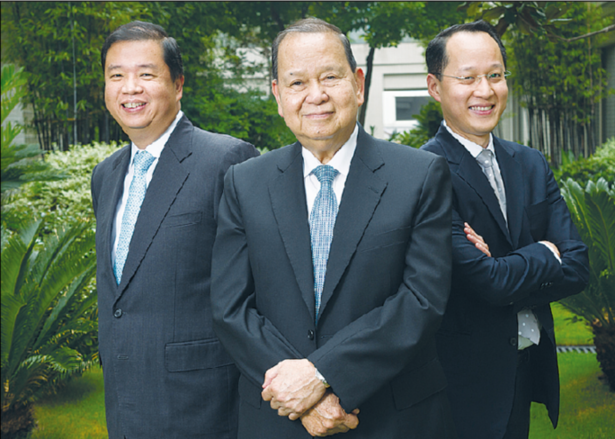Taking over the reins and stepping into his father's shoes
 |
|
Larry Chan (right), poses with his father Carlos (center) and second brother Archie at Liwayway China’s headquarters in Shanghai. Provided to China Daily |
To Larry Chan, his father Carlos has always been a doting figure, a successful businessman and a generous philanthropist that he and his five siblings have always tried to emulate.
Carlos introduced Liwayway, the family's snack business in the Philippines, to China in 1993, setting up two joint ventures in Shanghai and creating the brand Shanghaojia, a Chinese equivalent of its already successful Oishi back in the Philippines. Over the span of a decade, the brand grew to become one of the most popular in the market.
In 2005, Carlos was conferred the Honorable Citizen of Shanghai Award for his outstanding contributions to the city's development. The event was a major affair for the family. After all, Carlos was the first Filipino to receive the accolade.
Following the award ceremony, Chan's mother told him matter-of-factly that he should also attempt to bring home another award for family.
To Chan, that was simply too tall a task. "That's not possible," was his reply.
On Sept 30, Chan was made to eat those words as he became one of the two foreign residents in Shanghai to receive the award. Since its launch in 1989, the Honorable Citizen of Shanghai Award has only been given to 43 expatriates.
A father's foresight
Like his father, Chan has been a long-time resident of Shanghai. He first started helping with the family business in China in 1996. By early next year, the 44-year-old would have spent more time in Shanghai than in his home country.
"Shanghai is my second home," said Chan, who is presently the president and chief executive officer of Liwayway, China.
In 1975, the Chan family started producing prawn crackers using Japanese technology and hence chose the Japanese term "Oishi", which means "delicious", as the brand name. When it came to expanding the business, Carlos had his eyes set on Shanghai.
"My father was very interested in Shanghai because he frequently watched Chinese movies during his growing-up years. Those movies were mostly made in Shanghai," said Chan.
"He always told us that Shanghai would one day be glorious again. I still remember him telling me that I would be going to Shanghai after my graduation."
Chan said that his father had as early as 1984 started planning for an expansion project in China. Shanghai was one of the cities he visited the most. In 1993, when China opened the gates to foreign investment, the company wasted no time in making its entry.
The first step in the expansion was establishing joint ventures with two State-owned Shanghai food processing plants as this allowed the company to hit the ground running.
By 1996, Oishi was declared a "Shanghai famous brand". Over the past two decades, the company has never lost its spot among the top five snack food brands in China.
Recipe for success
As head of the company's China operation, Chan said he admires his father's decision to brand Oishi as a local product from the very beginning.
Chan recalled that Carlos came up with the term Shanghaojia, the Chinese brand name for Oishi, because it encapsulates several meanings. In the Hokkien dialect, the term means "very delicious". In Chinese, the term could mean "supremely good" or even "Shanghai is a good home".
Chan added that this localization approach was pivotal in the company's expansion in China as Shanghai has always had a reputation for being a place that produced innovative goods of high quality.
"Shanghai itself is a brand. If people know it was made in Shanghai, there is already a level of trust," said the Filipino.
Chan noted that the company's main challenge today is to maintain its reputation as one of the top brands in the world's most competitive market. To achieve this, the company has been channeling its focus on innovation. Liwayway's factory in Shanghai's suburban Qingpu district also serves as the company's research and development center. Chan revealed that the brand will be introducing new products by the end of this year.
Paying it forward
To Chan, securing a bright future for the company is important not because it boosts profits but because it also allows the company to contribute more to society, either as a tax payer, a good employer or as a generous donor.
This philosophy of giving back to society, said Chan, is one that successful ethnic Chinese in the Philippines take pride in. Carlos has been donating fire engines, ambulances and school buildings back in his home country.
"We derive our meaning to life mostly from how much one can contribute to the society," explained Chan.
Li Peiming, the executive vice-president of Liwayway China - he used to work for one of the two State-owned food plants the company partnered with - recalled that many of the Chinese workers were anxious about job security when the joint ventures took place.
According to Li, it was the Chan family's modesty and compassion that eventually won their trust and loyalty.
In fact, Liwayway even became one of the most sought-after employers in the market. Over the past decade, the company has employed hundreds of workers who were laid-off due to the restructuring of State-owned enterprises.
Li pointed out that the Chans have also been very generous when it comes to donations to disaster relief and education initiatives in China.
In 2007, Oishi became the main sponsor of the first Special Olympics in Shanghai. The following year, Carlos donated 12 million yuan ($1.82 million) from his own pocket to help with relief efforts for the Wenchuan earthquake.
"I think the honor of winning the Magnolia Award has encouraged my father to become more active in social causes," said Chan, adding that his father has set an example for him to follow.
Just as his mother expected him to follow in his father's footsteps, Chan has similar expectations for his two teenage children in terms of taking over the family business and maintaining the tradition of giving back to the community.
Using himself as an example, Chan believes his children would not decline taking over the reins.
"Anyway, food is not a very difficult industry to be interested in," he smiled.
















